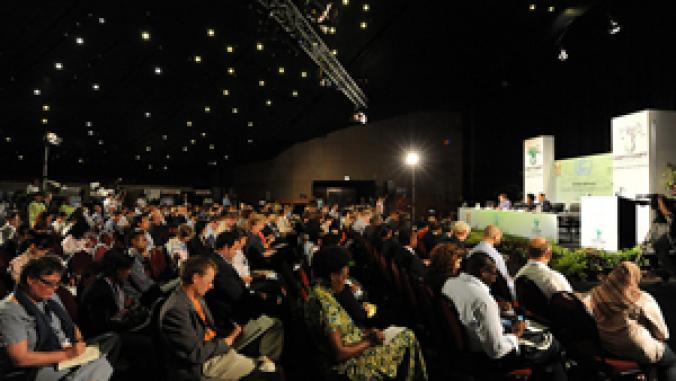5 Highlights from the World Climate Summit
<p>This weekend, about 600 global executives gathered for an industry-focused side event to the UN's COP17 negotiations. here are some of the top-level takeaways.</p>

From December 3-4, during the weekend intermission of the COP17 negotiations, approximately 600 executives from a broad array of international companies gathered in Durban at the second annual World Climate Summit to discuss green economy opportunities and challenges.
WCS is one of several industry-related side events that are purposefully scheduled alongside the COP negotiations. World Business Council for Sustainable Development (WBCSD) and Business for the Environment (B4E) also host annual events.
The proliferation of business forums attests to industry's greater involvement in climate policy and climate solutions.
"Over the past few years, big business has really engaged on the climate change issue," says Richard Gledhill, Lead Partner at PricewaterhouseCoopers.
The 2011 WCS program provides an important networking and informational forum for industry leaders. Attendees included executives from Siemens, PwC, Accenture, GE, Coca-Cola, Dow and AVON. Panel discussions cover many familiar topics such as efficiency solutions, financing options, and private-public partnerships. This year, there was a tick up in focus on water, transportation, and women's leadership.
Here are highlights from this year's WCS:
• The green economy can expand regardless of the COP outcome, but clear policy outcomes will accelerate growth. South African President Jacob Zuma opened the Summit with a charge to business leaders. "Business need not wait for outcomes in Durban. Forge ahead. There are many opportunities to pursue [to build a green economy]."
Although executives from Coca-Cola, Dow and Accenture do see and are developing sustainable products and operations, they feel that policy would accelerate and expand the opportunities.
"At some point, we need government cooperation. If we don't have effective public-private partnerships, it's going to take longer," explains Russel Mills, Global Director of Energy and Climate Change for Dow Chemical.
• Sustainability efforts must comprehend human factors; they must attend the bottom of the pyramid. Christiana Figueres, Executive Secretary of the U.N. Framework Convention on Climate Change, opened WCS with an overview of COP17. She framed the UN negotiations in business terms.
"COP is about governments coming together to develop a business plan for tackling climate change. We are planning for triple bottom line."
She emphasized that the Durban negotiations have made it clear that poverty must be addressed in the plan and called on business leaders to recognize the bottom of the pyramid.
• Existing technology can significantly address emissions problems. Barbara Kux, Chief Sustainability Officer for Siemens, declared: "The good news is that I have in my suitcase today the tools to solve 38 percent of our problem."
• Green solutions and innovations are often more expensive, until they scale; businesses must partner to finance the transitions. According to Russel Mills of Dow, new, lower carbon solutions require upfront investments and are more expensive. Companies need to partner with government and other parties to help scale production and markets.
Coca-Cola has found and unlikely partner in Heinz. Coca-Cola has developed a 30 percent plant-based bottle; its goal is to move to 100 percent. They have shared the packaging technology with Heinz for free. By expanding production volumes for the plant-based packaging, Heinz's involvement helps bring the unit costs down.
• Companies are grappling with downstream -- customer and end-consumer -- sustainability challenges. Industry may be doing its share to reinvent its operations, but the consumer has often lagged in adopting greener practices.
According to Russel Mills, Dow sees itself as an "invisible enabler; "We are tackling the consumption end of things, finding ways to innovate in every stage of the value chain. Ultimately we want to help our customers become more efficient without them even noticing."
Coca-Cola, on the other hand, is working to provide more sustainable product in more sustainable packaging and make the developments very transparent and known to its consumers. Their product is sugar water in plastic bottle. They are working to water balance their operations -- putting back as much water as they use. They are innovating packaging to make it fully plant-based and recyclable. Their mission is to develop consumer knowledge about sustainable choices.
Bea Perez, Coca Cola's newly appointed Chief Sustainability Officer, explains: "We want our consumers to know that in buying Coca-Cola products, they are making a more sustainable choice. Their purchase is a vote for the green economy."





